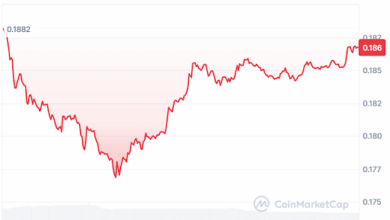Why do more and more people feel that the crypto market is becoming boring?
The reason why cryptocurrency is boring is that too many unresolved questions have already been answered.
"The reason why cryptocurrency is boring is that too many unresolved questions have been answered."
Source: cryptoslate
Translation: Blockchain Knight
Do you remember when Crypto Twitter felt like sitting in the front row of a blockbuster movie?
The market was like a runaway roller coaster, narratives flipped as frequently as pancakes, and every week was filled with Hollywood-level suspense and excitement.
But where has all of that gone now?
If you still miss those days of "parabolic K-lines" and bitcoin surging 20% in a single day, Nic Carter wants you to smile through your tears: the reason crypto is boring now is because we have won.
From major exchange collapses to Eastern bans, from Elon Musk’s market-moving tweets to the COVID-19 black swan event, the development path of the crypto industry has been nothing short of dramatic.
Jamie Dimon (CEO of JPMorgan) once denounced bitcoin as a "fraud" and even threatened to fire any JPMorgan employee involved in crypto trading.
Now, the world’s largest bank is stockpiling stablecoins. Dimon has even admitted: "Crypto is real, and stablecoins are real."
JPMorgan not only allows clients to use bitcoin and ethereum as collateral for loans, but has also launched its own blockchain infrastructure.
Are those wild days really gone for good? Has crypto really become boring? Should we look for a new asset class for excitement?
It turns out that Gandhi’s famous saying, "First they ignore you, then they laugh at you, then they fight you, then you win," may fit the trajectory of crypto better than anyone imagined.
The core of this shift in atmosphere, as Nic Carter said in his post on X, is that the reason for reduced volatility is that we have won.
He stated: "The reason why cryptocurrency is boring is that too many unresolved questions have been answered."
Speculation about whether stablecoins would be banned or whether writing smart contracts would land you in jail has long become a thing of the past.
The extreme volatility of "getting rich in the morning, bankrupt by the afternoon" stemmed from regulatory uncertainty—no one knew when the rules might suddenly change.
Now, the "Stablecoin Regulation Act" clarifies the regulatory rules for stablecoins, and the "Crypto Asset Classification Clarification Act" draws a clear line between securities and non-securities.
Even the integration of crypto and traditional finance has shifted from a "hot topic with risk premiums" to a "historical footnote."
When "holding U.S. Treasuries on-chain" becomes routine business, and BlackRock’s crypto ETF products no longer spark controversy, volatility naturally decreases, and crypto becomes "boring."
Although price movements are now uneventful, for many, the once "wild opportunities" now feel like "the playground has been turned into a parking lot."
Bitcoin analyst Will Clemente commented: "To be honest, the vibe in my crypto chat groups is really down—many people have either completely given up and moved to other asset classes, or are preparing to do so."
But Clemente doesn’t regret this. In his view, regulatory clarity, Wall Street’s entry, and boring stability are all proof that crypto has "won."
The entire industry has matured: what was once a "tech risk playground" has now become the "technical foundation layer" adopted by global giants. The new rules of the game are no longer about "exploiting legal loopholes," but about "building truly value-creating products in the sunlight."
Wall Street hasn’t just joined the party—it has taken control of the narrative.
BlackRock, JPMorgan, and even Dimon’s dramatic change of attitude have all become classic crypto stories.
From "deniers" to "builders," the shift of established powers has ended the old model of "chaos-driven, rewarding speculators."
Now, crypto really is boring. The rigor of traditional finance has brought real capital, reliable custody, and robust infrastructure.
The "Wild West" legends are being replaced by compliance teams, pension fund allocators, and cautious bankers.
All of this is good, but some of us still miss those wild, outlaw days. The "history of crypto development" always feels strangely familiar.
Disclaimer: The content of this article solely reflects the author's opinion and does not represent the platform in any capacity. This article is not intended to serve as a reference for making investment decisions.
You may also like
Hong Kong’s HKMA Launches Fintech 2030 to Drive Future Financial Innovation

Balancer DeFi Hack: $70.9M in Crypto Stolen
DeFi protocol Balancer suffers a major exploit with $70.9M in crypto drained. Team yet to respond.Funds Moved to New WalletWhat’s Next for Balancer and DeFi Security?

Dogecoin Price Prediction Targets November Surge, While BullZilla Steals the Spotlight Among Best Meme Coin Presales in 2025
BullZilla and Dogecoin battle for investor attention among the best meme coin presales in 2025 as BullZilla’s presale explodes and Dogecoin eyes a recovery from recent declines.Dogecoin Price Prediction: A Chance for a Strong ComebackBullZilla: Exploding Ahead in the Best Meme Coin Presales in 2025Conclusion

Bitcoin Dips as Whale Sales Trigger $414M in Liquidations
Crypto markets dip as whales sell $2B in BTC, leading to $414M in liquidations amid rising geopolitical risks.Liquidations Top $414M as Sentiment Turns FearfulMarket Cap Falls Amid Uncertainty

